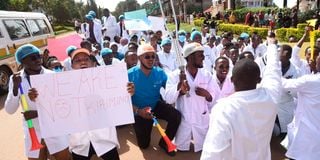Premium
We won’t back down, doctors warn State on looming strike

Doctors demonstrate in Eldoret town, Uasin Gishu County on March 01, 2024, over the attack of medics' union Secretary General Dr Devji Atellah.
What you need to know:
- Medics' union wants the government to allocate 15 per cent of its annual budget to Health.
- Government has said it does not have the Sh 4.9 billion needed to hire and post medical interns.
The government has until Tuesday midnight to resolve issues that could lead to a doctors’ strike.
The medics are demanding the hiring of interns and at least Sh569 billion set aside as the Health budget.
The Kenya Medical Practitioners Pharmacists and Dentists Union (KMPDU) says public hospital doctors will boycott work if talks with government officials fail.
The union wants the government to allocate 15 per cent of its annual budget to Health.
The doctors say doing so would solve problems blamed on inadequate resource allocation, misplaced priorities, dependence on donor funding and corruption.
“In 2001, African leaders met in Abuja and made commitments to dedicate 15 percent of their national budgets to healthcare delivery. As of 2021, only South Africa and Cape Verde had kept this promise. Of even greater concern is how Kenya has progressively reduced its allocation to the Health docket, the latest is Sh141 billion out of a 3.79 trillion budget (3.7 percent). The highest allocation ever was seven percent,” Dr Dennis Miskellah, the union’s Deputy Secretary-General, says.
The union wants the Public Finance Management Act 2012 amended to consider human resources for health as development and also proposes reorganising the health delivery system where community health practitioners (CHPs), Levels 1,2, and 3 facilities are managed by county governments, and Levels 4,5 and 6 managed by the national governments.
Dr Miskellah also indicated that the government should operationalise the Facility Improvement Fund to allow hospitals to utilise their funds.
The strike notice come after the KMPDU Secretary-General, Davji Atellah was last week injured on the head while doctors held demonstrations demanding swift posting of interns and demanding payment of school fees for specialist doctors which have been delayed for eight months and four years, respectively.
Dr Attellah was admitted to the high dependency unit at Nairobi Hospital, and was later taken to the male wards. He has since been discharged and is recovering at home.
The government has maintained its stand that it does not have the Sh 4.9 billion needed to hire and post medical interns.
“They (medical interns) have not been posted because they want a salary which I don’t have. To post them all, I need Sh4.9 billion, I don’t have that money. If the Treasury gives me money, then I will post them. If the Treasury does not give me, then I will have to change the law so that they can be affordable. Otherwise, for now, they are not affordable,” Health Cabinet Secretary Susan Nakhumicha said in Narok last week.
According to the data from the KMPU, a total of 1,210 medical interns are yet to be posted, despite the internship policy stating that they should be posted 30 days after graduation.
They include 849 medical officer interns (those with Bachelor’s degrees in medicine and surgery), 72 dental officer interns (those with Bachelor’s degree in dental surgery) and 289 pharmacist interns (those with bachelor’s degree in pharmacy).
Sunday Nation spoke to five of the interns in the middle of the impending strike and what life has been like for them — after a fantastic score in the final secondary school exams, more than five years in the university studying various medical courses, and the pain of having to go on the streets to be placed on internship, a mandatory precursor before being allowed to operate as a doctor.





